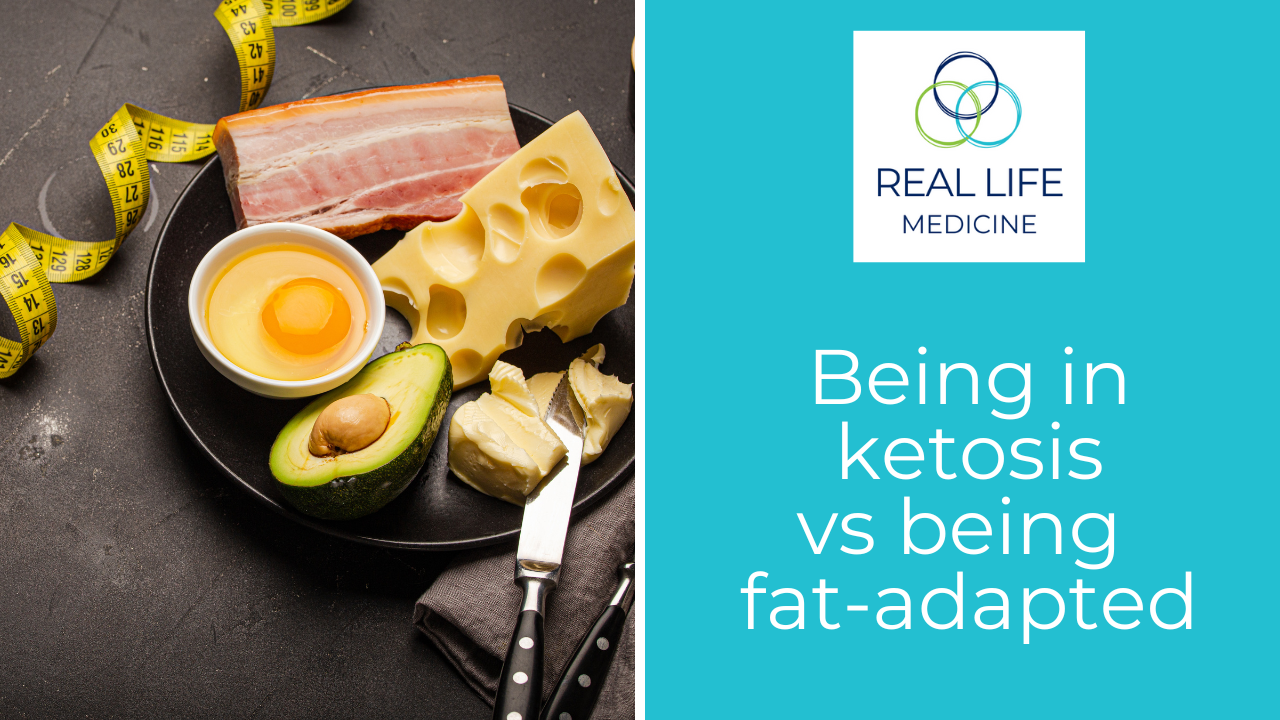
Being in ketosis vs being fat adapted
Jun 22, 2022There is much confusion about these two concepts so let’s discuss these and do some myth-busting.
Firstly, let's talk about ketosis.
Ketosis means you have ketones in your blood.
Ketones are produced in the liver and are a byproduct of fat breakdown.
This occurs when your body no longer has access to glucose as fuel. Your body has used all its glycogen stores (glycogen is where glucose is stored for ready access and is in the muscles and liver). When these stores are empty, the body moves on to metabolise fat. The by-products of fat breakdown are ketones which the body can use for fuel.
Here’s the thing, if you are high circulating insulin, you cannot access your fat stores to be used for fuel. When you first start a low carb or ketogenic diet, the ketones are produced by the fat you eat.
You can be in ketosis but not burning your body fat.
Ketosis vs Ketoacidosis
What is ketosis?
Ketosis or as we like to call it, nutritional ketosis occurs when your body produces ketones after burning fat for fuel.
How do I know if I am in ketosis?
The symptoms
- You may have a change in your breath. This may be a metallic taste or even a fruity/acetone taste.
- You may get a diuresis-meaning you will have increased urine output and wee more
- You may get more energy and increased mental clarity
- Ketones are an appetite suppressant so you may find you are less hungry
- You can check your levels if you want to, by using a blood or a breath monitor.
- Anything above 0.3mmol means you are in ketosis. More is not necessarily better.
Do not use urine strips-they are inaccurate and only test the spillover of ketones-not your blood level.
What is ketoacidosis?
This is a term that refers to the change in blood acid levels due to excessive ketone production. It is dangerous and life-threatening but is not the same as nutritional ketosis. When ketone levels are above 5mmol, the risk of ketoacidosis is very high.
People most at risk of ketoacidosis are people who are
- Type 1 Diabetes
- Type 2 Diabetes who are dependent on insulin
- Taking SGLT2 inhibitors eg Jardiance, (empagliflozin) Forixiga (dapagliflozin)
- Have prolonged and heavy alcohol use
- Breast feeding mothers
If you fall into one of these categories, transitioning to a low carb or ketogenic diet needs medical supervision.
What is Fat Adaptation?
This is the term used when you have full access to your stored fat. Your fat burning enzymes are upregulated and your body can access its fuel freely.
This can only occur when our insulin levels are low.
Your woodshed is open! For more details on the woodshed go here.
How long does it take to be fat-adapted?
Your woodshed can take some time to fully open. This can depend on your underlying insulin resistance and how consistent you are with your low-carb or ketogenic diet.
We usually quote between 4-12 weeks. For most people, it is approximately 8 weeks.
How do I know if I'm fat-adapted?
Your hunger will decrease as your body now has access to its stored fuel.
You will find you have increased mental clarity.
You will find that fasting becomes easier.
You will longer get tremulous or dizzy if you don't eat
Your physiological cravings will decrease (you may still have emotional cravings but that is a different story)
Should I take exogenous ketones or ketone supplements?
The short answer is no, except in very specific circumstances. It is far better to get your ketones from your food as part of a low-carb real food diet.
When you first start a low-carb lifestyle, keep your carbs low by eating on the green list.
Avoid the red list.
Add plenty of fat for fuel.
Over time as your woodshed begins to open reduce your fat consumption and burn the fat on your body. As you are losing weight, we want to make sure it is only fat and not muscle so you must have adequate protein.
At Real Life Medicine, we only recommend exogenous ketones if weight loss or reversing metabolic syndrome is not the goal. There is potentially a role for use with ADHD but that isn't proven yet and also possibly a role with serious underlying mental health conditions. There are many multi-level marketing companies selling ketone supplements with unfounded claims so be wary.

